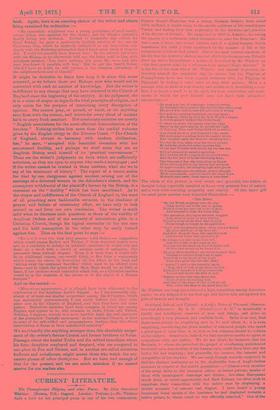CURRENT LITERATURE.
Francis Daniel Pastorius was a young German lawyer, born about 1650, inclined, it would seem, to the mystic opinions of his countryman Tauler, and finding their best expression in the doctrine and practice of the Society of Friends. He emigrated in 1683 to America, becoming the a;zierni; of a settlement called Germantown, near the Delaware. Ho was a man of large and varied culture, and of a genial temper, which sometimes felt itself a little straitened by the manner of life of the communion which ho bad joined. One of the most fervent emotions of his life was the hatred of slavery against which the Germantown Friends drew up, under his guidance, a memorial, described by Mr. Whittier as "the first protest made by a religious body against Negro Slavery." It is the life of this man which Mr. Whittier sets himself to picture, re- dressing himself the complaint that he makes that the Pilgrims of Pennsylvania have not been equally fortunate with the Pilgrims of Plymouth in finding a vates sacer to sing their praises. Here is a passage with no little of true beauty and pathos in it, describing a con- flict, if so harsh a word is to be used, between convictions and senti- ments of which the post himself may not have been altogether unconscious :— " Re sang not; but, if sometimes tempted strong,
He hummed what seemed like Aitorf's Burschen-song, His good wife smiled, and did not count it wrong.
"For well he loved hie boyhood's brother band ; His Memory, while he trod the New World's strand, A double-ganger walked the Fatherland !
"If, when on frosty Christmas eves the light Shone en his quiet hearth, he missed Use sight Of Yule-log, Tree, and Christ-child all iu white; "And closed his eyes, and listened to the sweet Old wait-songs sounding down his native street, And watched again the dancers' mingling feet ; "Yet not the less, when once the vision passed, He held the plain and sober maxims fast Of the dear Friends with whom his lot was east.
"Still all attuned to nature's melodies, He loved the bird's song in his dooryard trees, And the low ham of home-returning bees; " The blossomed flax, the tulip-trees in bloom Down the long street, the beauty and perfume Of apple boughs, the mingling light and gloom "Of Sommerhausen's woodlands, woven through With sun-threads; and the music the wind drew, Mournful and sweet, from leaves it over-blew."
The whole of the picture is very sweet and graceful, two habits of thought being especially manifest in it,—a very genuine love of nature, and a very wide-reaching sympathy and charity. Of this latter gift we must quote another very beautiful illustration :-
"Tats Homy.
" My old Welch neighbor over the way Crept slowly out in the sun of spring, Pushed from her ears the locks of gray, And listened to hear the robinaing.
"Her grandson, playing at marbles stopped And, cruel in sport as boys will be, Tossed a stone at the bird, who hopped From bough to bough in the apple-tree.
"'Nay!' said the grandmother, 'have you not heard, My poor, bad boy! of the fiery pit, And how, drop by drop, this merciful bird Carries the water that quenches it?
" He brings cool dew in his little bill, And lets it fall on the souls of sin: You can see the mark on his red breast still Of fires that scorch as he drops it in.
"My poor Bron rhuddyn! my breast-burned bird, Singing so sweetly from limb to limb, Very drat to the heart of Our Lord
• Is he who pities the lost like Him !'
" Amen!' I said to the beautiful myth ; 'Sing, bird of God, in my heart as well : Each good thought is a drop wherewith To cool and lessen the fires of hell.
"Prayers of love like rain-drops fall, Tears of pity are cooling dew, And dear to the heart of Our Lord are all Who suffer like Him in the good they do!"
Mr. Whittier has long ago achieved a high reputation among American poets ; we are delighted to see that age still leaves him unimpaired his gifts of melody and thought.


































 Previous page
Previous page